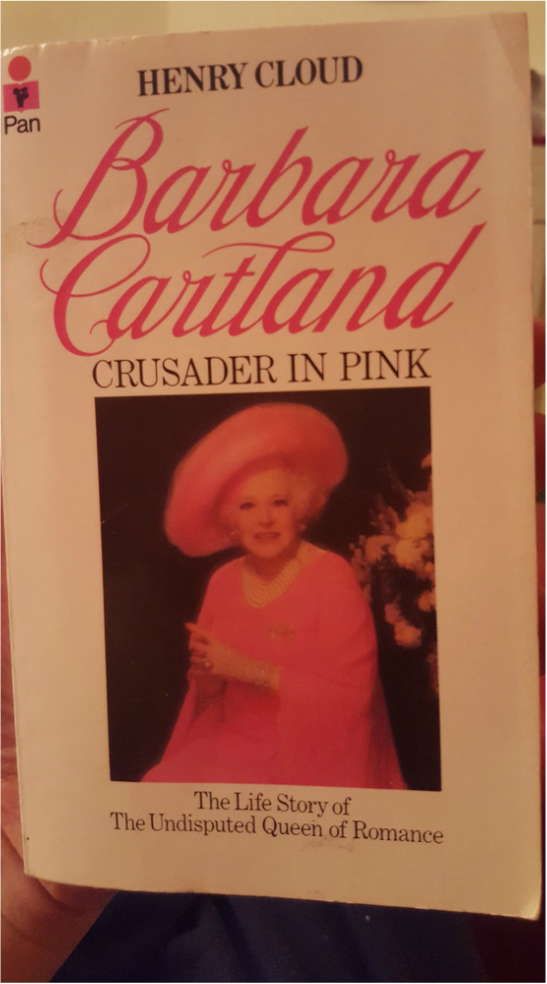This is the first in a series of blogs in which I’ll analyse and comment on passages from the biography which I hope you’ll find interesting.
This section below was in a chapter called The ‘Factory’ about how she writes in Camfield Place in 400 acres of park and woodland near Hatfield House.
My comments are in italics after each section from the biography.
All text not in italics are from Henry Cloud’s Barbara Cartland Crusader in Pink 1979.

She walks from the dining-room, followed by her dogs, across the hall and into Grandpa Potter’s big library...There she makes herself comfortable on a big yellow-brocade sofa in front of the fire – a hot water bottle at her feet and over her legs a pink rug covered in white fur.
I’ve often written in bed. I think it’s important to write somewhere where one is comfortable. Often Domino sits next to me as I type away on my Neo. Are we sitting comfortably? Then we’ll begin...
Mrs Audrey Elliot, her literary secretary, sits behind her, pad in hand. As an extra safeguard a tape-recorder is switched on. And for the next two and a half hours, Barbara dictates a chapter of her latest novel. It was Godfrey Winn who first advised her to do this: ‘The words you speak are so much more immediate and sincere than those you write,’ he explained to her – invaluable advice.
For she has taught herself the virtuoso art of unhesitating dictation. It requires extraordinary powers of concentration, and Mrs Elliott, apart from being very accurate, has long discovered how to remain invisible and totally discreet throughout the process.
Having a secretary to take down what you say aloud in shorthand is certainly a product of its time. In 1979 pre-computers in the office, a secretary would have taken letters shorthand and then typed them. Nowadays where everyone in the workplace tends to have their own computer, shorthand is a dying art. Even a chief executive would probably reply to their own correspondence (emails now). Dictating your writing would, I’m sure, make it much more conversational style. One of the criticisms of overly clunky cloying writing is it feels like writing. If you write like you talk, that pitfall can be avoided. I’ve been told I write exactly like I talk – which is a nice complement I feel. I wrote an academic essay and was told although it covered all the requisite parts, it was in first person (the point of view I prefer to write my fiction in) and was far too conversational (just like my fiction, I’m told). To be able to simply talk a story out loud while someone takes it down in shorthand is an enviable skill. I’ve not tried dictation software yet, but I know many other authors who dictate their fiction now, so it appears straight on the word processing programme from their lips. Because I write all over the place – trains, tubes, libraries, cafes etc, this wouldn’t work for me, but I’m told it’s a great way of getting a 5000 – 7000 daily word output relatively easily – which is what Cartland enviably did.
She herself describes the process: ‘As I sit there I’m simply telling myself a story, and I am told my voice changes as I take each separate part – I see exactly what is happening as I describe it and I live through each dramatic incident.’
For me, this is exactly how it feels when I’m writing a first draft. Once I’ve sketched out the plot and got to know the characters, I actually ‘see’ the story in my mind’s eye, and simply write what I see through my fingers. Although I could say what I see, as Cartland did, it would be harder in the variety of places where I write than typing it. Because I can touch type, about 60 – 100 words per minute (using the home row and not looking at the keyboard) so the translation between my mind seeing it, and my fingers typing it is relatively seamless.
If you fancy a bit of romance, with some summer sizzle and sex, check out Heat Wave Astoria
Brad's shop is known as the most popular tourist attraction for certain men in his home town, Astoria. Brad doesn't do relationships -- why would he? He’s an unashamed slut, and he loves it.
British IT programmer James is much happier working with software and computers than people. He finds escape in his encyclopedic knowledge of childhood films like The Goonies and Short Circuit.
When James walks into a quilting shop in Astoria, he decides he'll take his brother's advice and talk to a stranger. That stranger is Brad, melting slowly behind the counter during the longest heat wave America's had in years.
Buy links: JMS Books Amazon.com Amazon.co.uk
I'd love to hear what you thought about Cartland's writing process and my comments on it.
Liam Livings xx
 RSS Feed
RSS Feed
